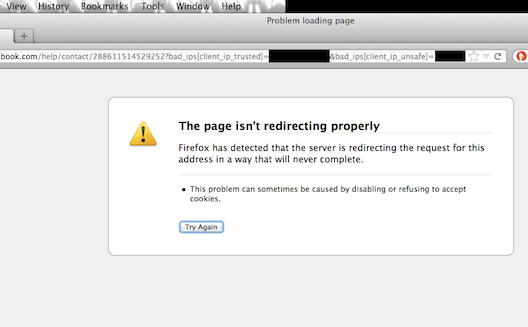Update: Facebook resolves Tor issues

UPDATE: Tor has posted that Facebook is not blocking Tor.
"A high volume of malicious activity across Tor exit nodes
triggered Facebook's site integrity systems which are designed to
protect people who use the service. Tor and Facebook are working
together to find a resolution."
From Facebook at 9:30 EEST: "Facebook's site integrity systems
detected automated malicious activity coming from a significant
number of Tor exit nodes. In order to protect people while we
investigated the problem, access via these nodes was temporarily
suspended. This issue has now been resolved and Tor access routes
to Facebook restored."
Of course, as Jessica Roy at BetaBeat points out, the sheer amount of internet buzz
and speculation around this topic yesterday points to widespread
distrust of Facebook, for better or worse.
In the wake of revelations that the U.S.'s National Security
Agency has been conducting large-scale surveillance on traffic from
major U.S. tech companies, we've noticed that Facebook may have
blocked Tor, a software that enables anonymous browsing on the
web.
At time of print, using Tor to access Facebook resulted in the
following addendum to the Facebook URL:
"show_form=blocked_ip&bad_ips[client_ip_trusted]...&bad_ips[client_ip_connecting]...&bad_ips[client_ip_prelb]"
(ellipses are substituted for IP addresses).

Social technology platform @Meedan and others reported
the same problem.

Several commentors began reporting the issue on a
few
Tor forums on June 16th. Loading any Facebook URLs from
the same computer, here in the Middle East, while using various IP
addresses, worked fine on Chrome; only the Tor browser was blocked
by Facebook.
Some have reported that it may be an encryption configuration
problem, in other words, a bug rather than an intentional
block.

If it is, in fact, a block, it would be dark day for internet
freedom, especially in the Arab world, where Tor has played an
ongoing instrumental role in helping activists protect their
identities while organizing protests.
In 2011, Tor won the Free Software Foundation's Award for
Projects of Social Benefit. "Using free software," the FSF
wrote
at the time, "Tor has enabled roughly 36 million people around
the world to experience freedom of access and expression on the
Internet while keeping them in control of their privacy and
anonymity. Its network has proved pivotal in dissident movements in
both Iran and more recently Egypt."
The role that Tor and Facebook played in facilitating the
dissemination of information under restrictive regimes cannot be
underestimated. If this is an intentional block, Facebook is
sounding the death knell for an era in which Zuckerburg's
brainchild was lauded as a weapon of protest.
Perhaps it is just a glitch, perhaps not. The mission
articulated in Zuckerburg's IPO filing letter to Facebook investors comes back to haunt
us:
"We believe building tools to help people share can bring a more
honest and transparent dialogue around government that could lead
to more direct empowerment of people, more accountability for
officials and better solutions to some of the biggest problems of
our time.
By giving people the power to share, we are starting to see people make their voices heard on a different scale from what has historically been possible. These voices will increase in number and volume. They cannot be ignored. Over time, we expect governments will become more responsive to issues and concerns raised directly by all their people rather than through intermediaries controlled by a select few.
Through this process, we believe that leaders will emerge across
all countries who are pro-internet and fight for the rights of
their people, including the right to share what they want and the
right to access all information that people want to share with
them."


